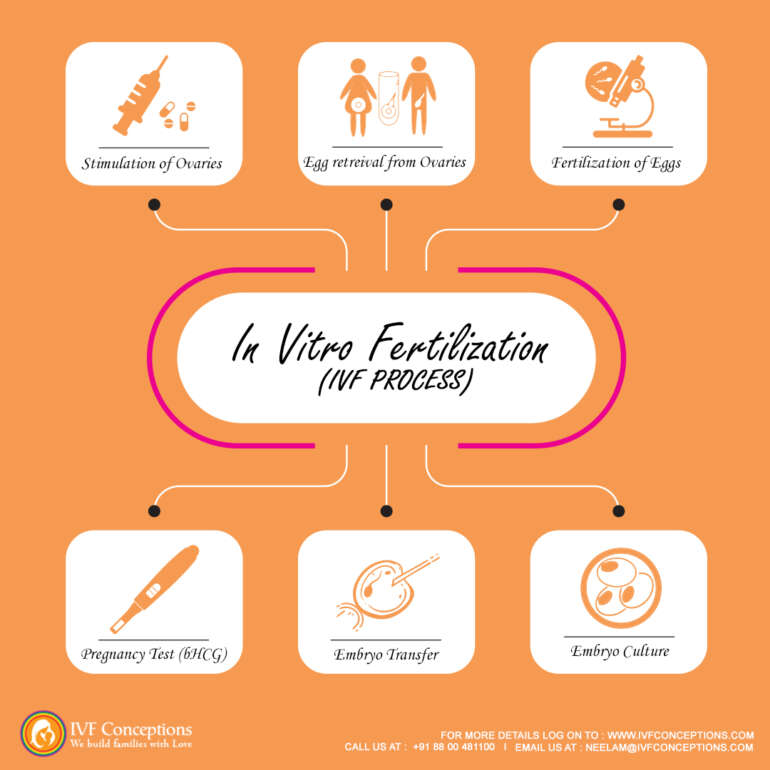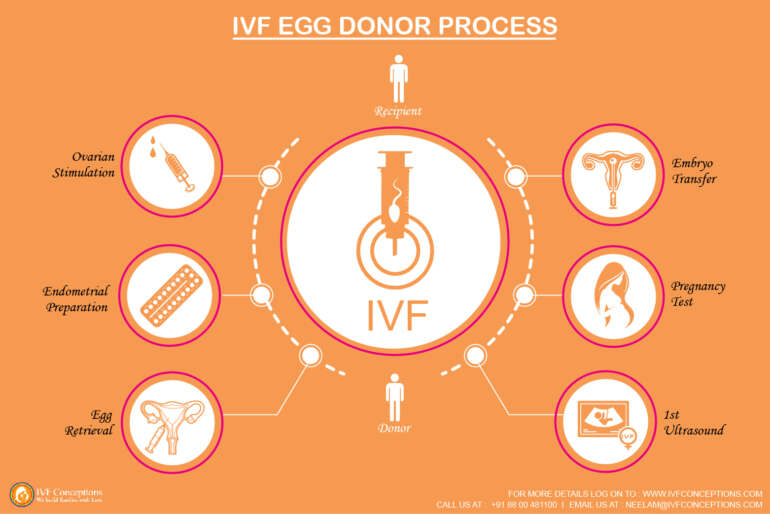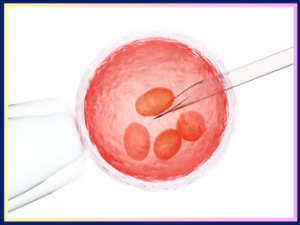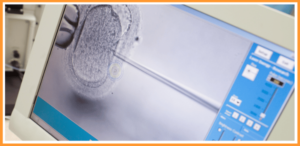IVF in Georgia Guide-Find best Surrogacy clinic in Georgia Country

In Vitro Fertilization (IVF) is a widely used assisted reproductive technology that involves retrieving eggs from a woman’s ovaries and fertilizing them with sperm in a laboratory setting. The resulting embryos are then transferred into the woman’s uterus, to achieve a successful pregnancy. In this blog, we will discuss about IVF in Georgia.
- Book an online appointment: Get a free online consultation.
- Call\W:+91-8800481100 Email:neelam@ivfconceptions.com
IVF has become an increasingly popular fertility treatment option for couples struggling with infertility. According to the Centers for Disease Control and Prevention (CDC), over 330,000 IVF cycles were performed in the United States in 2019, resulting in the birth of over 81,000 babies.
The success rates of IVF have steadily improved over the years, thanks to advancements in technology and refinements in the procedures. The CDC reports that the live birth rate per embryo transfer for women under 35 years old is around 50%, making IVF a viable and promising option for many couples seeking to conceive.
Additional Guides for Surrogacy in Georgia
What are the Starting Steps for Surrogacy Process in Georgia?
How Much Does Surrogacy Cost in Georgia Country
Surrogacy for Hetero Couples in Georgia Europe
IVF falls under the broader category of Assisted Reproductive Techniques (ART), which encompasses various medical procedures used to help individuals or couples achieve pregnancy. Other ART procedures include:
- Intrauterine insemination (IUI)
- Gamete intrafallopian transfer (GIFT)
- Zygote intrafallopian transfer (ZIFT)
- Embryo cryopreservation (freezing)
While IVF is the most common and widely used ART procedure, it’s essential to understand that each couple’s situation is unique, and the appropriate treatment plan may involve a combination of different techniques.
In this comprehensive guide, we’ll explore the IVF process in detail, covering everything from the initial consultation and testing to the embryo transfer and post-transfer care. We’ll also discuss factors that influence IVF success rates, potential risks, and side effects, and the emotional and financial considerations involved in this journey.
In-vitro fertilization (IVF) – commonly known as In Vitro Fertilization is a process in which combining eggs and sperm is done manually in the laboratory. The resulting embryos are then transferred to the female partner’s uterus in hope of successful implantation. IVF is one of the most commonly used treatments for Assisted Reproductive Technologies and has a success rate. The entire process is completed successfully in the best IVF clinics in Georgia. Our IVF treatment cost in Georgia will go well with your budget. IVF is a process in which a single live sperm is injected into the center of a single human egg.
We are the IVF clinic in Georgia that offers ART Services with a leading fertility clinic with an outstanding success rate. We also offer other assisted techniques like- Assisted Hatching (AH) and Embryoscope to improve the success rate of our fertility treatment.
Our promoted low-cost IVF Centre in Georgia employs state-of-the-art medical facilities and a highly-skilled workforce to offer the most modern Assisted Reproduction Technologies services for couples. Our advanced fertility specialists are experts in providing medical solutions to infertility issues stemming from low sperm/egg count and abnormalities in eggs that lead to unsuccessful pregnancies via IVF.
Our Fertility clinic in Georgia makes use of ICSI to address these issues, offering foolproof results for those who have not managed to enjoy success at parenthood even via IVF. Highly skilled and experienced embryologists select a single, healthy sperm and inject it directly into the egg’s cytoplasm. The fertilized egg is allowed to reach the blastocyst stage before being implanted into the uterus, thus assuring more number of embryos and a greater chance of success.
IVF Meaning and IVF Process:
IVF stands for In Vitro Fertilization, which literally means “fertilization in a glass.” It is an assisted reproductive technology that involves combining an egg and sperm outside the body in a controlled laboratory environment.

The IVF process typically involves the following steps:
- Ovarian Stimulation: The woman undergoes hormone therapy to stimulate the ovaries to produce multiple mature eggs, rather than the single egg typically released during a natural menstrual cycle.
- Egg Retrieval: Once the eggs have matured, they are retrieved from the ovaries using a minor surgical procedure called follicular aspiration. This is typically performed under sedation or general anesthesia.
- Fertilization: The retrieved eggs are then combined with sperm in a laboratory dish, allowing fertilization to occur. In some cases, a single sperm may be injected directly into the egg (a process known as Intracytoplasmic Sperm Injection or ICSI) if there are issues with the sperm.
- Embryo Culture: The fertilized eggs (now called embryos) are allowed to grow and develop in a controlled laboratory environment for several days.
- Embryo Transfer: One or more of the highest-quality embryos are selected and transferred into the woman’s uterus using a thin catheter. The remaining embryos may be frozen (cryopreserved) for potential future use.
IVF can be an effective solution for individuals or couples facing various fertility issues, including:
- Blocked or damaged fallopian tubes, which prevent the egg from traveling to the uterus
- Low sperm count or poor sperm motility, makes it difficult for the sperm to fertilize the egg naturally
- Ovulatory disorders or diminished ovarian reserve, resulting in the inability to produce viable eggs
- Unexplained infertility, where no specific cause can be identified
Additionally, IVF may be recommended for individuals with certain genetic disorders or those who have previously undergone unsuccessful fertility treatments.
Who Needs IVF?
IVF is typically recommended for couples who have been unable to conceive after trying for an extended period, typically 12 months for women under 35 years old or 6 months for women over 35. It may also be an option for:
- Women with ovulation disorders or endometriosis
- Men with low sperm count or motility issues
- Individuals with genetic disorders or a history of unsuccessful fertility treatments
- Same-sex couples or single individuals seeking to have a child
| Stage | Description | Approximate Timeline |
|---|---|---|
| 1. Consultation and Testing | Initial consultation with the fertility specialist, medical history review, and diagnostic testing (e.g., bloodwork, ultrasound, semen analysis) | 1-2 months |
| 2. Ovarian Stimulation | The woman takes fertility medications to stimulate the ovaries to produce multiple eggs | 10-14 days |
| 3. Egg Retrieval | A minor surgical procedure to retrieve the mature eggs from the ovaries | 1 day |
| 4. Fertilization and Embryo Culture | The retrieved eggs are fertilized with sperm in the laboratory, and the resulting embryos are cultured | 3-5 days |
| 5. Embryo Transfer | One or more embryos are transferred into the woman’s uterus | 1 day |
| 6. Embryo Cryopreservation (optional) | Any remaining high-quality embryos are frozen for potential future use | 1 day |
| 7. Progesterone Supplementation | The woman takes progesterone supplements to support the uterine lining | 10-14 days |
| 8. Pregnancy Test | A blood test is performed to confirm pregnancy | 9-11 days after embryo transfer |
| 9. Early Pregnancy Monitoring | If pregnant, the woman receives early prenatal care and monitoring | Ongoing |
Please note that these timelines are approximate and can vary depending on the individual circumstances, the fertility clinic’s protocols, and any additional procedures or treatments required. The entire IVF cycle, from consultation to pregnancy test, typically takes around 4-6 weeks, but the preparation and any necessary tests can add several weeks or months to the overall process.
The surrogate mother IVF process is the same in all countries. For more information read under services.
More Resources to Read:
Guaranteed Surrogacy in Georgia
How Does Gestational Surrogacy Work in Georgia? Step-by-step Guidance
Surrogate Mother Cost in Georgia
Egg Donor IVF:

Egg Donor IVF is an assisted reproductive technique that involves using eggs donated by another woman to achieve pregnancy. This option can be a solution for individuals or couples who are unable to produce viable eggs for fertilization due to various reasons, such as:
- Premature ovarian failure or diminished ovarian reserve
- Genetic disorders that could be passed on to offspring
- Previous unsuccessful IVF attempts due to poor egg quality
- Same-sex male couples or single men seeking to have a child
The process of Egg Donor IVF typically involves the following steps:
- Donor Selection: Potential egg donors undergo extensive medical and genetic screening to ensure they are healthy and have no inheritable diseases or conditions. Intended parents can choose a donor based on specific criteria such as physical characteristics, educational background, and medical history.
- Synchronization: The donor’s menstrual cycle is synchronized with the intended mother’s (or gestational carrier’s) cycle through the use of fertility medications. This ensures that the embryo transfer can take place at the optimal time.
- Egg Retrieval: The donor undergoes ovarian stimulation and egg retrieval, similar to the traditional IVF process.
- Fertilization and Embryo Culture: The donated eggs are fertilized with the intended father’s sperm (or donor sperm) in a laboratory setting, and the resulting embryos are cultured.
- Embryo Transfer: One or more embryos are transferred into the intended mother’s (or gestational carrier’s) uterus, with the goal of achieving a successful pregnancy.
Legal and Ethical Considerations: Egg Donor IVF involves legal and ethical considerations that must be carefully navigated. In most cases, the egg donor relinquishes all parental rights to any resulting children. Legal contracts are typically established to protect the rights and responsibilities of all parties involved.
Additionally, there are ongoing debates surrounding the compensation of egg donors, with some arguing that it could potentially lead to the exploitation of vulnerable individuals.
Egg donor IVF price in Georgia is between $10,000 to $15,000.
Success Rates: The success rates of Egg Donor IVF are generally higher compared to traditional IVF, as the donor’s eggs are typically of higher quality. According to the Society for Assisted Reproductive Technology (SART), the live birth rate per embryo transfer for Egg Donor IVF cycles in 2019 was around 50% for women under 35 years old and 35-37% for women aged 38-40.
It’s important to note that success rates can vary depending on various factors, such as the age of the intended mother (or gestational carrier), the quality of the embryos, and the fertility clinic’s experience and protocols.
Success rates of IVF based on the age of the woman:
| Woman’s Age | Live Birth Rate Per Embryo Transfer |
|---|---|
| Under 35 | 50% |
| 35-37 | 35-40% |
| 38-40 | 25-30% |
| 41-42 | 15-20% |
| Over 42 | 5% or lower |
This data is based on the latest report from the Society for Assisted Reproductive Technology (SART) and the Centers for Disease Control and Prevention (CDC), which analyzed IVF success rates in the United States in 2019.
It’s important to note that these are approximate rates and can vary depending on various factors, such as:
- Cause of infertility
- Ovarian reserve and egg quality
- Sperm quality
- Embryo quality
- Reproductive health history
- IVF clinic’s experience and success rates
Additionally, the success rates are generally higher for younger women and tend to decrease with advancing age, primarily due to the declining quality and quantity of a woman’s eggs over time.
It’s crucial to consult with a fertility specialist to understand your individual chances of success with IVF based on your specific circumstances and medical history.
How Much Does IVF Cost:
IVF treatment cost in Georgia country is less than US IVF treatment cost. A typical IVF cost in Georgia for a full cycle is $3,000 to $5,000.
The cost of IVF treatment can be a significant financial consideration for many individuals and couples. Here’s a breakdown of the typical costs associated with the IVF process:
- Initial Consultation and Diagnostic Testing:
- Consultation with a fertility specialist: $250 – $500
- Diagnostic tests (bloodwork, ultrasound, semen analysis): $500 – $1,500
- Fertility Medications:
- Ovarian stimulation medications: $3,000 – $6,000 per cycle
- IVF Procedures:
- Egg retrieval: $1,000 – $3,000
- Fertilization and embryo culture: $1,000 – $3,000
- Embryo transfer: $500 – $1,500
- Additional Services:
- Intracytoplasmic Sperm Injection (ICSI): $1,000 – $2,000
- Assisted Hatching: $500 – $1,000
- Preimplantation Genetic Testing (PGT): $3,000 – $6,000
- Cryopreservation (embryo freezing): $500 – $1,000 per year of storage
- Anesthesia and Facility Fees: $1,000 – $3,000
The total cost of a single IVF cycle can range from $12,000 to $25,000 or more, depending on the specific services required and the location of the fertility clinic.
Insurance Coverage and Financial Assistance: Many insurance plans in the United States do not cover IVF treatment or have limited coverage, making it a significant out-of-pocket expense for many couples. However, some states have laws that require insurance companies to provide coverage for fertility treatments, including IVF.
For those who do not have insurance coverage or need financial assistance, there are several options to explore:
- Fertility Clinic Financing Plans: Some fertility clinics offer financing plans or payment arrangements to help make the costs more manageable.
- Fertility Treatment Loans: Several companies specialize in providing loans specifically for fertility treatments, often with more favorable terms than traditional loans.
- Grants and Financial Assistance Programs: Various organizations and foundations offer grants or financial assistance programs to help cover the costs of IVF for those who meet specific eligibility criteria.
- Crowdfunding: Platforms like GoFundMe have become popular for individuals and couples seeking to raise funds for IVF treatment through online fundraising campaigns.
- Employer Benefits: Some employers offer fertility treatment coverage as part of their employee benefits package, so it’s worth checking with your employer’s human resources department.
It’s important to research and explore all available options to understand the full cost implications and potential avenues for financial assistance when considering IVF treatment.
Typical costs associated with IVF treatment:
| Cost Component | Approximate Cost Range |
|---|---|
| Initial Consultation and Diagnostic Testing | $750 – $2,000 |
| Fertility Medications (per cycle) | $3,000 – $6,000 |
| IVF Procedures: | |
| – Egg Retrieval | $1,000 – $3,000 |
| – Fertilization and Embryo Culture | $1,000 – $3,000 |
| – Embryo Transfer | $500 – $1,500 |
| Additional Services: | |
| – Intracytoplasmic Sperm Injection (ICSI) | $1,000 – $2,000 |
| – Assisted Hatching | $500 – $1,000 |
| – Preimplantation Genetic Testing (PGT) | $3,000 – $6,000 |
| – Cryopreservation (per year of storage) | $500 – $1,000 |
| Anesthesia and Facility Fees | $1,000 – $3,000 |
| Total Cost for a Single IVF Cycle | $12,000 – $25,000 (or more) |
It’s essential to discuss the expected costs with your fertility clinic and explore potential insurance coverage or financial assistance options to help manage the expenses associated with IVF treatment.
IVF surrogacy costs in Georgia are much lower than in Western countries. It is possible to do a full cycle IVF egg donor surrogacy for as low as $50,000.
IVF vs IUI: What you need to know
 While both IVF (In Vitro Fertilization) and IUI (Intrauterine Insemination) are assisted reproductive technologies, they differ in several ways:
While both IVF (In Vitro Fertilization) and IUI (Intrauterine Insemination) are assisted reproductive technologies, they differ in several ways:
- Procedure:
IUI is a less invasive procedure where the sperm is directly inserted into the woman’s uterus around the time of ovulation.
IVF involves retrieving eggs from the woman, fertilizing them with sperm in a laboratory, and transferring the resulting embryo(s) into the woman’s uterus.
- Success Rates:
IVF generally has higher success rates than IUI, especially for couples with more complex fertility issues.
According to the CDC, the live birth rate per cycle for IVF is around 30-35% for women under 35, while for IUI, it’s around 10-20%.
- Cost
IUI is typically less expensive than IVF, with costs ranging from $300 to $1,000 per cycle
IVF can cost anywhere from $12,000 to $25,000 or more per cycle, depending on the additional services required.
- Indications:
IUI may be recommended for couples with unexplained infertility, mild male factor infertility, or ovulatory disorders.
IVF is often recommended for couples with more severe infertility issues, such as blocked fallopian tubes, endometriosis, low ovarian reserve, or severe male factor infertility.
The decision between IVF and IUI will depend on various factors, including the cause of infertility, age, and personal preferences. It’s essential to consult with a fertility specialist who can evaluate your situation and provide guidance on the most appropriate treatment option.
Here’s a table comparing IVF (In Vitro Fertilization) and IUI (Intrauterine Insemination):
| Aspect | IVF | IUI |
|---|---|---|
| Procedure | More invasive process involving egg retrieval, fertilization in a lab, and embryo transfer | Less invasive process where sperm is directly inserted into the uterus around ovulation |
| Success Rates | Higher success rates, around 30-35% live birth rate per cycle for women under 35 | Lower success rates, around 10-20% live birth rate per cycle |
| Cost | Typically $12,000 – $25,000 or more per cycle | Typically $300 – $1,000 per cycle |
| Indications | Recommended for more complex fertility issues like blocked fallopian tubes, endometriosis, low ovarian reserve, severe male factor infertility | Recommended for unexplained infertility, mild male factor infertility, ovulatory disorders |
| Monitoring | Requires close monitoring and frequent visits to the fertility clinic during the cycle | Relatively less monitoring compared to IVF |
| Medication | Involves injectable fertility medications for ovarian stimulation | May involve oral or injectable fertility medications, depending on the case |
| Process Duration | Typically takes 4-6 weeks per cycle | Typically takes 2-3 weeks per cycle |
| Multiple Birth Risk | Higher risk of multiple births (twins, triplets, etc.) due to multiple embryo transfers | Lower risk of multiple births as only one or two follicles are targeted |
| Genetic Testing | Allows for preimplantation genetic testing (PGT) of embryos | PGT not possible as fertilization occurs in vivo |
This table highlights the key differences between IVF and IUI in terms of the procedures, success rates, costs, indications, monitoring requirements, and other aspects. The choice between the two treatments depends on the specific fertility situation and should be made in consultation with a fertility specialist.
Understanding IVF with PGD
 In Vitro Fertilization (IVF) and Preimplantation Genetic Diagnosis (PGD) are two advanced reproductive technologies that can be combined to help couples conceive a healthy baby while minimizing the risk of passing on genetic disorders to their child.
In Vitro Fertilization (IVF) and Preimplantation Genetic Diagnosis (PGD) are two advanced reproductive technologies that can be combined to help couples conceive a healthy baby while minimizing the risk of passing on genetic disorders to their child.
IVF is a process where eggs are retrieved from the woman’s ovaries and fertilized with sperm in a laboratory setting. The resulting embryos are then transferred into the woman’s uterus, with the goal of achieving a successful pregnancy.
PGD, on the other hand, is a genetic testing technique that involves analyzing the embryos created through IVF for specific genetic disorders or chromosomal abnormalities before they are transferred to the uterus.
By combining IVF and PGD, couples have the opportunity to select and transfer only those embryos that are free from the genetic disorders they are at risk of passing on to their child. This approach not only increases the chances of a successful pregnancy but also reduces the risk of having a child with a specific genetic condition.
The benefits of IVF with PGD include:
- Early diagnosis: PGD allows for the identification of genetic disorders at the embryonic stage, before implantation, providing valuable information for decision-making.
- Reduced risk: By selecting embryos without the targeted genetic disorders, couples can significantly reduce the risk of passing on these conditions to their child.
- Increased success rates: By transferring only genetically healthy embryos, the chances of a successful pregnancy may be improved.
- Emotional reassurance: Knowing that the embryo transferred is free from the specific genetic disorders being tested for can provide peace of mind and emotional relief for couples.
IVF with PGD for Gender Selection
While the primary purpose of IVF with PGD is to identify and avoid genetic disorders, some couples may also consider using this technology for gender selection. In this context, PGD can be used to determine the sex of the embryos, allowing couples to choose the gender of their future child.
There are various reasons why some couples may consider gender selection through IVF with PGD, including:
- Family balancing: Couples with multiple children of the same gender may desire to have a child of the opposite gender to achieve a balanced family composition.
- Gender-linked genetic disorders: Certain genetic disorders, such as Duchenne muscular dystrophy or hemophilia, are linked to a specific gender, and couples may choose to avoid passing on these conditions by selecting an embryo of the opposite gender.
IVF with PGD Cost in Georgia
The cost of IVF with PGD in Georgia can be a significant financial consideration for couples seeking this advanced reproductive treatment. While the exact cost may vary depending on individual circumstances and the specific fertility clinic, here’s an overview of the typical expenses:
- IVF cycle cost: The cost of a standard IVF cycle in Georgia ranges from $5,000 to $10,000, which includes the cost of medications, egg retrieval, embryo culture, and embryo transfer.
- PGD cost: The additional cost for Preimplantation Genetic Diagnosis can range from $3,000 to $6,000, depending on the specific genetic tests being performed.
- Additional expenses: Couples may incur additional costs for consultations, ultrasounds, bloodwork, and other related services throughout the IVF with PGD process.
Benefits and potential drawbacks of IVF with PGD:
| Benefits | Potential Drawbacks |
|---|---|
| Early detection of genetic disorders and chromosomal abnormalities | Invasive procedure for embryo biopsy |
| Reduced risk of passing on specific genetic conditions to the child | Possibility of false-positive or false-negative results |
| Increased chances of a successful pregnancy with a healthy baby | Emotional stress and anxiety associated with the process |
| Ability to select embryos free from gender-linked disorders | Ethical concerns surrounding gender selection for non-medical reasons |
| Provides valuable information for informed decision-making | High costs associated with PGD testing and IVF treatment |
| Avoids the need for prenatal testing and potential termination | Destruction of embryos not suitable for transfer |
| Emotional reassurance for couples at risk of genetic disorders | A limited number of embryos available for transfer after testing |
How Does IVF Works?

Consultation
Discuss with a Fertility Expert to Make a treatment plan for the optimum success of IVF.

Ovary Stimulation
Medicine and Injections are given to stimulate ovaries to produce many eggs for fertilization.

Final Trigger Shot
The final trigger is given to release the mature eggs in timely pickups
process.

Sperm Collection
The egg picks up is done under mild anesthesia with a US guide. Fresh sperm collected the same day.

Fertilization
The eggs and sperm are allowed to fertilize naturally or via ICSI. The embryo grow monitoring done.

Transfer Day
Fresh or frozen embryo transfer is done. After 2 weeks of BHCG tests are done to confirm pregnancy.
Conclusion:
In this comprehensive IVF guide, we’ve explored the ins and outs of this assisted reproductive technology, including the meaning and process of IVF, egg donor IVF, success rates, costs, and how it compares to other fertility treatments like IUI.
Understanding the complexities of IVF is crucial for individuals and couples considering this path to parenthood. It’s a journey that requires careful consideration, emotional preparedness, and a thorough understanding of the potential risks, success rates, and financial implications.
If you’re struggling with infertility, it’s essential to seek guidance from a qualified fertility specialist. They can evaluate your unique situation, provide personalized recommendations, and help you navigate the various treatment options available, including IVF.
Remember, every couple’s journey to parenthood is different, and the decision to pursue IVF should be made after weighing all the factors and consulting with medical professionals. With the right information and support, IVF can be a viable and rewarding path to building the family you’ve dreamed of.

If you’d like to learn more about IVF, Egg Donation, or surrogacy services globally, check out the rest of our website at Complete Surrogacy. We offer legally secure and affordable surrogacy consulting services for FREE.
Our team has over 14 years of experience facilitating surrogacy arrangements, egg donation, and serving as an advocacy resource for infertile couples and LGBTQ individuals seeking to build families.
For more resources on IVF and Surrogacy, browse our other web page- IVF Conceptions
References used:









